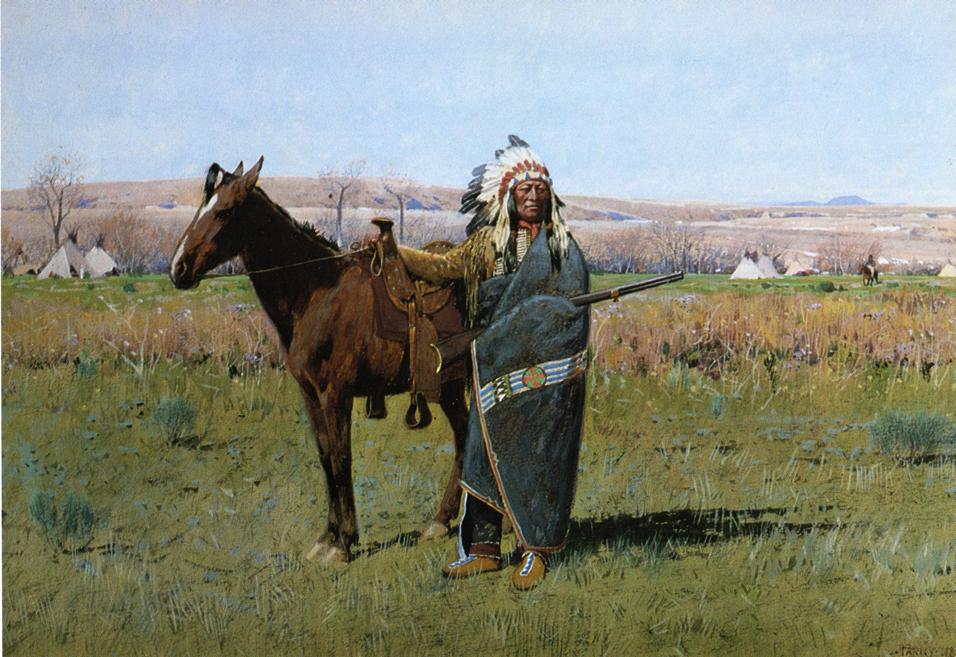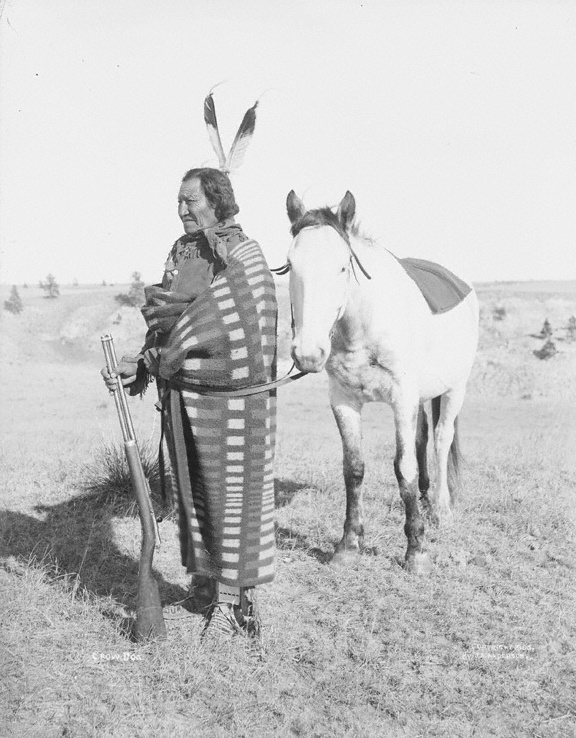Crow Dog on:
[Wikipedia]
[Google]
[Amazon]
Crow Dog (also Kȟaŋǧí Šúŋka, Jerome Crow Dog; 1833 – August 1912) was a

 On August 5, 1881, after a long-simmering feud, Crow Dog shot and killed principal chief
On August 5, 1881, after a long-simmering feud, Crow Dog shot and killed principal chief
''Ex parte Crow Dog'', 109 U.S. 556, 3 S.Ct. 396, 27 L.Ed. 1030 (1883)
{{DEFAULTSORT:Crow Dog 1833 births 1912 deaths Brulé people Lakota leaders Native American people of the Indian Wars People from Montana
Brulé Lakota
The Brulé are one of the seven branches or bands (sometimes called "sub-tribes") of the Teton (Titonwan) Lakota people, Lakota Native Americans in the United States, American Indian people. They are known as Sičhą́ǧu Oyáte (in Lakota langu ...
subchief, born at Horse Stealing Creek, Montana Territory
The Territory of Montana was an organized incorporated territory of the United States that existed from May 26, 1864, until November 8, 1889, when it was admitted as the 41st state in the Union as the state of Montana.
Original boundaries
...
.
Family
He was the nephew of former principal chiefConquering Bear
Matȟó Wayúhi ("Conquering Bear") ( 1800 – August 19, 1854) was a Brulé Lakota chief who signed the Fort Laramie Treaty (1851). He was killed in 1854 when troops from Fort Laramie entered his encampment to arrest a Sioux who had shot a cal ...
, who was killed in 1854 in an incident which would be known as the Grattan massacre. He was the great-grandfather of Leonard Crow Dog
Leonard Crow Dog (August 18, 1942 – June 5, 2021) was a medicine man and spiritual leader who became well known during the Lakota takeover of the town of Wounded Knee on the Pine Ridge Indian Reservation in South Dakota in 1973, known as th ...
(1942–2021), a practitioner of traditional herbal medicine, a leader of Sun Dance
The Sun Dance is a ceremony practiced by some Native Americans in the United States and Indigenous peoples in Canada, primarily those of the Plains cultures. It usually involves the community gathering together to pray for healing. Individua ...
ceremonies, and preserver of Lakota traditions.
Life
Crow Dog was a traditionalist and one of the leaders who helped popularize theGhost Dance
The Ghost Dance ( Caddo: Nanissáanah, also called the Ghost Dance of 1890) was a ceremony incorporated into numerous Native American belief systems. According to the teachings of the Northern Paiute spiritual leader Wovoka (renamed Jack Wil ...
. After receiving a vision, Jerome warned several dancers to stay away from a large gathering of tribes in 1890 thus saving them from being victims of the Wounded Knee Massacre.
Murder trial

 On August 5, 1881, after a long-simmering feud, Crow Dog shot and killed principal chief
On August 5, 1881, after a long-simmering feud, Crow Dog shot and killed principal chief Spotted Tail
Spotted Tail (Siŋté Glešká pronounced ''gleh-shka''; birth name T'at'aŋka Napsíca "Jumping Buffalo"Ingham (2013) uses 'c' to represent 'č'. ); born c. 1823 – died August 5, 1881) was a Brulé Lakota tribal chief. Although a great war ...
(who was also at the Grattan massacre), on the Rosebud Indian Reservation
The Rosebud Indian Reservation is an Indian reservation in South Dakota, United States. It is the home of the federally recognized Rosebud Sioux Tribe, who are Sicangu, a band of Lakota people. The Lakota name ''Sicangu Oyate'' translates as t ...
. A grand jury
A grand jury is a jury—a group of citizens—empowered by law to conduct legal proceedings, investigate potential criminal conduct, and determine whether criminal charges should be brought. A grand jury may subpoena physical evidence or a p ...
was convened and he was tried and convicted in Dakota Territorial court in Deadwood, South Dakota
Deadwood ( Lakota: ''Owáyasuta''; "To approve or confirm things") is a city that serves as county seat of Lawrence County, South Dakota, United States. It was named by early settlers after the dead trees found in its gulch. The city had ...
, and sentenced to death which was to be carried out on January 14, 1884. He was imprisoned in Deadwood pending the outcome of his appeals. According to historian Dee Brown in his bestselling book, '' Bury My Heart at Wounded Knee'':
White officials... dismissed the killing as the culmination of a quarrel over a woman, but Spotted Tail's friends said that it was the result of a plot to break the power of the chiefs...In 1883, writs of ''habeas corpus'' and ''
certiorari
In law, ''certiorari'' is a court process to seek judicial review of a decision of a lower court or government agency. ''Certiorari'' comes from the name of an English prerogative writ, issued by a superior court to direct that the record of ...
'' were filed on his behalf by lawyers who volunteered to represent him ''pro bono
( en, 'for the public good'), usually shortened to , is a Latin phrase for professional work undertaken voluntarily and without payment. In the United States, the term typically refers to provision of legal services by legal professionals for pe ...
''; his case was argued in November 1883 before the U.S. Supreme Court
A supreme court is the highest court within the hierarchy of courts in most legal jurisdictions. Other descriptions for such courts include court of last resort, apex court, and high (or final) court of appeal. Broadly speaking, the decisions of ...
in ''Ex parte Crow Dog
''Ex parte Crow Dog'', 109 U.S. 556 (1883), is a landmark decision of the Supreme Court of the United States that followed the death of one member of a Native American tribe at the hands of another on reservation land. Crow Dog was a member of th ...
''. On December 17, 1883, the court ruled in a unanimous decision that according to the provisions of the Treaty of Fort Laramie, signed on April 29, 1868, and approved by Congress on February 28, 1877, the Dakota Territorial court had no jurisdiction over the Rosebud reservation and subsequently overturned his conviction. This ruling cited a previous Supreme Court ruling in ''Worcester v. Georgia
''Worcester v. Georgia'', 31 U.S. (6 Pet.) 515 (1832), was a landmark case in which the United States Supreme Court vacated the conviction of Samuel Worcester and held that the Georgia criminal statute that prohibited non-Native Americans from bei ...
'', 31 U.S. (6 Pet.) 515 (1832), a case brought by the Cherokee
The Cherokee (; chr, ᎠᏂᏴᏫᏯᎢ, translit=Aniyvwiyaʔi or Anigiduwagi, or chr, ᏣᎳᎩ, links=no, translit=Tsalagi) are one of the indigenous peoples of the Southeastern Woodlands of the United States. Prior to the 18th century, th ...
tribe against the state of Georgia
Georgia most commonly refers to:
* Georgia (country), a country in the Caucasus region of Eurasia
* Georgia (U.S. state), a state in the Southeast United States
Georgia may also refer to:
Places
Historical states and entities
* Related to the ...
, in which the court ruled that Native Americans were entitled to federal protection from the actions of state governments which would infringe on the tribe's sovereignty
Sovereignty is the defining authority within individual consciousness, social construct, or territory. Sovereignty entails hierarchy within the state, as well as external autonomy for states. In any state, sovereignty is assigned to the perso ...
.
Major Crimes Act
In response to the ruling in ''Ex parte Crow Dog'', the U.S. Congress passed the Major Crimes Act () in 1885. It places 15 major crimes under federal jurisdiction if they occur on Native territory, even if both perpetrator and victim are Native American, beginning a legal doctrine limiting tribal sovereignty.Later life
Crow Dog returned to the Rosebud Indian Reservation, where he remained for the rest of his life. He died there in August 1912.See also
*Leonard Crow Dog
Leonard Crow Dog (August 18, 1942 – June 5, 2021) was a medicine man and spiritual leader who became well known during the Lakota takeover of the town of Wounded Knee on the Pine Ridge Indian Reservation in South Dakota in 1973, known as th ...
* ''Ex parte Crow Dog
''Ex parte Crow Dog'', 109 U.S. 556 (1883), is a landmark decision of the Supreme Court of the United States that followed the death of one member of a Native American tribe at the hands of another on reservation land. Crow Dog was a member of th ...
''
References
External links
''Ex parte Crow Dog'', 109 U.S. 556, 3 S.Ct. 396, 27 L.Ed. 1030 (1883)
{{DEFAULTSORT:Crow Dog 1833 births 1912 deaths Brulé people Lakota leaders Native American people of the Indian Wars People from Montana